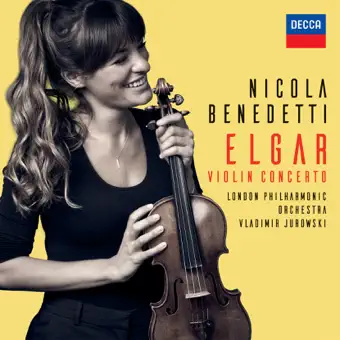juni 2020
Elgar
Nicola Benedetti & London Philharmonic Orchestra o.l.v. Vladimir Jurowski
Nicola Benedetti, een van de beste ambassadeurs van vandaag de dag voor muziek buiten het platform, is daar net zo inspirerend op, waarbij haar spel de emotionele diepten van Elgar omarmt.

Een gevoel van waardige terughoudendheid onderscheidt Vladimir Jurowski's behandeling van het openings-tutti van het Concerto, met veel veelzeggende houtblazersdetails en een stralende orkestrale verklaring van het mooie tweede onderwerp. Bedachtzaam is hoe ik Jurowski's dirigeren zou omschrijven, hard voor de verduisterde frase (2'45") die voorafgaat aan Nicola Benedetti's rhapsodische openingsmonoloog. Het opkomende effect is diep conversationeel, Benedetti's behandeling van het tweede idee in zijn solo-gedaante, helder en intiem. Vanaf ongeveer 8'50" brengt ze een gevoel van Brahmsiaans momentum naar Elgars gedurfde akkoordenschrift, hoewel het tutti dat volgt misschien had geprofiteerd van meer in de vorm van drive en momentum, zelfs verzet (zo'n prominent aspect van de aard van het werk). Toch zingt Benedetti inmiddels, wat betreft de strijkstok, haar hart uit, hoewel ik soms het gevoel heb dat Jurowski haar in toom houdt. Ik had liever een meer dialogische benadering gehad, maar op zichzelf genomen is het LPO-spel met veel gevoel.
Misschien wel het meest ontroerende aspect van deze uitvoering – ook een bewijs van Benedetti's talent om onder de huid van het stuk te kruipen – is de spookachtige begeleide cadens in de finale, waar ze boven de rustig tokkelende snaren zich overgeeft aan wat lijkt op een stroom van bewustzijn, hier en daar dwalend naar mensen als Brahms, Schumann en Paganini, voordat ze verwijst naar een van de opvallende thema's van het concert als een herinnering aan waar we echt zijn. Elgar lijkt hier een soort biecht te geven, zijn muzikale ziel bloot te leggen, en Benedetti volgt hem elke centimeter van de weg. Het langzame deel is ook erg mooi, warm maar nooit overdreven, terwijl Sospiri, onder de omstandigheden van het schrijven van deze recensie (de verschrikking en het verdriet van het coronavirus), dient als een diep ontroerend gedenkteken, zo groot is de kracht van muziek om het moment te markeren. Liefdevol spel ook in Salut d’amour en, vooral, Chanson de nuit, vrij snel genomen met een volle, rijpe toon, en mooi begeleid door Petr Liminov: Fauré schiet me te binnen, misschien in Shylock-modus. Maar het Concerto is het ding, Benedetti die een balk werpt op de overheersende kwaliteit ervan: oprechtheid. Adel ook; en hoewel andere digitale versies (Ehnes, Hahn, Znaider, Kennedy etc.) me ook hebben geraakt, heeft geen enkele die ik me kan herinneren me scherper bewust gemaakt van wat een geweldig werk dit is, daar samen met de concerten van Brahms, Schumann en Tsjaikovski, dat is zeker.

A sense of dignified reserve distinguishes Vladimir Jurowski’s handling of the Concerto’s opening tutti, with plenty of telling woodwind detail and a radiant orchestral statement of the lovely second subject. Thoughtful is how I’d describe Jurowski’s conducting, toughening for the darkened phrase (2'45") that precedes Nicola Benedetti’s rhapsodic opening monologue. The emergent effect is deeply conversational, Benedetti’s handling of the second idea in its solo guise, limpid and intimate. From around 8'50" she brings a sense of Brahmsian momentum to Elgar’s gutsy chordal writing, though the tutti that follows might have benefited from more in the way of drive and momentum, even defiance (such a prominent aspect of the work’s nature). Still, by now Benedetti is, in terms of the bow, singing her heart out, though I do sometimes sense that Jurowski is holding her in check. I’d have liked a more dialogic approach, though taken on its own terms the LPO play with plenty of feeling.
Perhaps the most moving aspect of this performance – also testimony to Benedetti’s knack of getting under the skin the piece – is the finale’s haunting accompanied cadenza, where above quietly strumming strings she indulges what seems like a stream of consciousness, wandering hither and thither to the likes of Brahms, Schumann and Paganini, before referencing one or other of the concerto’s salient themes as a reminder of where we really are. Elgar here seems to be indulging a sort of confessional, baring his musical soul, and Benedetti follows him every inch of the way. The slow movement is also very lovely, warm yet never overstated, whereas Sospiri, under the circumstances of writing this review (the horror and sadness of coronavirus), serves as a deeply moving memorial, such is the power of music to mark the moment. Affectionate playing too in Salut d’amour and, especially, Chanson de nuit, taken quite swiftly with a full, ripe tone, and nicely accompanied by Petr Liminov: Fauré springs to mind, maybe in Shylock mode. But the Concerto is the thing, Benedetti shining a beam on its reigning quality: sincerity. Nobility too; and although other digital versions (Ehnes, Hahn, Znaider, Kennedy etc) have also moved me, none that I can recall has made me more keenly aware of just what a great work this is, up there with the concertos of Brahms, Schumann and Tchaikovsky, that’s for sure.
